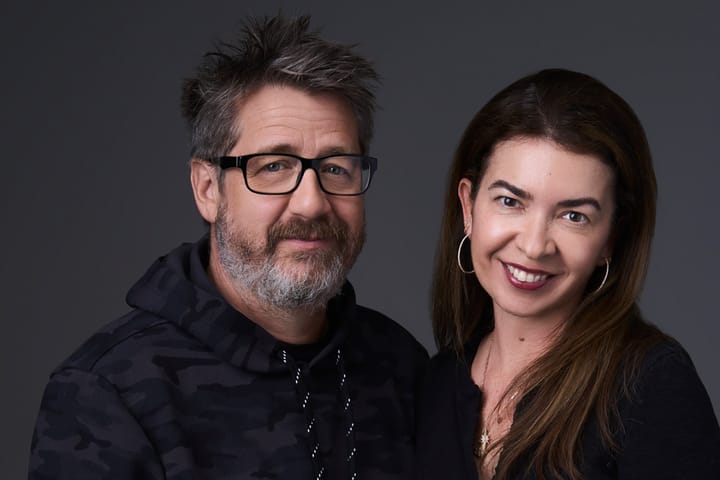Everything Freelance Directors Should Know in 2025

By Luke Lashley, Owner/Executive Producer, Departure
Commercial directors are having a moment of clarity. The allure of premium production company rosters isn't what it used to be, and both established directors and emerging talents are increasingly choosing to go independent rather than seeking traditional representation. Yet despite this surge in freelance directing, there's surprisingly little guidance out there on how to navigate these waters successfully.
At Departure, we work exclusively with freelance directors and speak with dozens of independent artists weekly. Read on for what we've learned, and the thorough how-to’s, about making it work in today's industry:
- Make friends with EPs (genuinely)
- Keep your portfolio current
- Read briefs, clear yourself, and get submitted…the right way
- On that note, don’t share boards
- Clear your schedule
- Make a deal memo
- And avert our list of red flags
Make Friends with EPs
As a freelancer, you have the luxury of building relationships with a wide range of EPs, rather than being beholden to just a few at the company that signed you. It's in your best interest to know many EPs and choose them strategically to cover different areas of the market, each providing you with unique board flow. Many of the directors I work closely with have strong relationships with more than a dozen EPs (me being one of them), who collectively provide them with steady board flow across a pretty diverse range of budget levels and sources. This gets them in on opportunities that are sometimes unique (like a direct-to-brand engagement that bypasses the wide director search process), as well as the large industry-wide "cattle calls" where seemingly every production company and their mother has the same board...and everything in between. This diversity of relationships is one of freelancing's greatest advantages.

So, your first move as a freelancer is making friends with EPs. The best way to do it is to email them. But keep in mind EPs are busy, so make it super easy on them when you reach out. Don't write a novella about your artistic journey or be so vague about your work that EPs can't quickly understand your value. Your initial contact should be concise, specific, and tailored to the company you're reaching out to. Here's a solid example:
Hey [EP NAME],
The frosty sequence in your recent Wendy's spot caught my eye - really beautiful stuff. I’m a tabletop director based in Seattle with national experience (Chick-fil-A, IHOP). Currently staying busy with productions in the $200k-ish range. Here's my reel: [link].
Would you be open to a quick call next week? I'm freelance and respond quickly to all clearance requests.
Let’s break down why this works. It opens by showing you’ve looked at their work, lays out your relevant experience, sets clear expectations about the size of work you've seen success with, establishes your freelance status, and provides immediate access to your work. Most importantly, it's brief while giving all the essential information an EP needs to decide if you might be a good fit for their projects. This is exactly the kind of email I love to receive.
Keep Your Showreel Fresh & Accessible
A small element that often gets overlooked (and it’s a pet peeve that I would love to see freelancers get better at): please make sure your work is downloadable somewhere centralized. This isn't just a convenience issue – it’s a necessity. EPs need to be able to pull your spots quickly when pitching you. If your work is buried in a password-protected Vimeo account or spread across multiple platforms, you're creating unnecessary friction in a process that needs to be seamless.
Also, don’t assume any EP is regularly checking your site. You want EPs to be submitting you with your latest and greatest work, so anytime you have something new, add it to your centralized download link and let your EPs know it’s there. A simple ‘Hey, just added my new Nike spot to my reel link - proud of how it turned out’ is all you need.
Read Briefs, Run Clearances, Get Submitted
Now, let’s talk about clearing yourself and submitting on boards. This is where the rubber meets the road in freelance directing. The golden rule is simple: read the damn brief (if you can), and respond to clearance requests within 30 minutes whenever possible.
First, the brief. You won’t always receive the brief (and that’s okay). Many boards are bound by NDAs, and keeping sensitive information private is a good thing. So if an EP can’t share the board with you, I’d recommend taking them at their word. But you should try to gather as much information as you can about the assignment, and decide if you’re a good fit.
Whatever you do, never assume the sales rep or the EP selected you based on the script’s specifics. Unfortunately, in my experience, a lot of the thought process that happens with some EPs and sales reps goes like this: “Oh! This is a comedy script! Let me submit Jill! She does comedy!” Just because you do comedy, and the board is comedic, it doesn’t make you a good fit. It’s on you as a freelancer to filter out jobs on which you’re not a good fit. If you’re not right for the job, or think the budget is unrealistic, be direct about it. Here’s how that might look:
Hey, thanks for thinking of me. I think this is too VFX-heavy for my reel to compete well. I'm going to pass. Next time!
Hey, love this script but I can't pull this off for $90k. I think they're being a little ambitious. Bummed, but I'm going to have to pass. Thanks!
This kind of honesty saves everyone time and, more importantly, builds trust. Any time you’re submitted on something for which you’re not a good fit, you’re diluting the value of your name.
Once you decide you are a good fit, clear yourself, and quickly. ‘Clearing’ simply means giving a production company permission to send you in. Remember, you’re freelance now—NOBODY has permission to submit you unless you grant it to them. Generally speaking, clear yourself in under 30 minutes. This isn’t about being overly eager; it’s about respecting a process that needs to move very quickly and not introducing unnecessary slowdowns to the system. A simple email or text to the EP saying “all clear, thanks for thinking of me” is sufficient.
Once you’ve cleared yourself, have a system to track what you’re up for, who submitted you, and when. This is mostly about avoiding double submissions. If you’re submitted by two companies on the same job, everyone looks bad—you, the production companies, and any reps involved. Here’s a common mistake by novice freelancers: A director notes only the client name in their records, not the agency name. Then they receive a clearance request that only mentions the agency and accidentally clear themselves twice.
This isn’t just about avoiding double submissions—it’s about managing your potential pipeline and making informed decisions about your availability. I know directors who track this with spreadsheets, phone notes, pen and paper, or who engage a freelance manager to handle it. Whatever works for you is fine. Just have a system.
Don't Share Boards
This note warrants its own section. So much of the hesitation from independent sales reps when it comes to freelancers is about board privacy and confidentiality. Please, if you’re a freelancer reading this, never share a board or a lead.
If you’re on the roster at a production company but not exclusive, and that company is requiring you to send them boards so they can have a “first look” and chase down the lead, stop doing that. It might seem harmless, but every time a lead is shared, it hurts all of our collective reputation. Protecting board privacy isn’t just about ethics. It’s about maintaining trust, keeping doors open, and ensuring that freelancers are taken seriously in the industry.
Check Your Schedule Before Committing
After you’ve been submitted, if the agency likes your reel, they’ll ask the production company to confirm your availability before finalizing the bid pool. If an EP is reaching out to check your schedule post-submission, that’s a great sign, because it means you’re close to being bid. But this is also the moment to take scheduling details seriously.

If you have conflicts or hesitations about working with the production company that submitted you, this is the time to withdraw. If you back out before the bid pool is finalized, you do not look bad, and neither does the production company. Do what you need to do to make sure you’re one hundred percent all-in on the job. That might mean talking with the production company to ensure they’ll give you the treatment support you need, making sure your calendar is open enough to take on the job, or rearranging prior commitments.
Whatever you do, never withdraw after the bid pool has been formed. This is the fastest way to damage your reputation, hurt the production company that’s bidding on you, and make it harder for all freelancers to be taken seriously. I’ve had directors drop out after the bid pool was finalized because their schedules changed, and I’ll never work with those freelancers again.
Get a Deal Memo in Place
If you win the job, congrats. Winning is brutal in this industry and insanely hard. Any win, no matter how small, is something to be proud of. But before you go any further, get a deal memo in place with the production company. Never do a handshake deal.
A deal memo doesn’t need to be complicated. Any written agreement is considered binding, as long as it includes:
- Offer
- Acceptance
- An exchange of value
- Mutual intent
- Legal purpose
Red Flags
Each production company and director is unique, so I’m hesitant to paint with too broad a brush. But there are a few red flags I encourage freelancers to keep an eye out for.
First, if a production company is trying to lowball your rate, that’s immediately a bad sign. Every job is a negotiation; sometimes directors need to adjust their usual day rate to make a budget work. I’m not saying you should be completely inflexible, but if a production company is saying early on that they can only do 50 percent of your going rate, I’d be hesitant to proceed. Have the rate conversation before the bid pool is finalized, so you can withdraw if the discussion sets off alarms.
Another big red flag is if the production company refuses to pay for treatment support. Any company demanding that you either pay for the treatment yourself, design the treatment yourself, or otherwise figure it out without their assistance and financial investment is not a serious player. If a production company won’t support you in the bidding process, it is safe to assume they won’t support you during production. It also shows a lack of respect for the competition and just how hard it is to win.
Getting into the bid pool is very hard. Winning is even harder. If a company has come so far as to get in the bid pool with you, but when they step up to the plate they refuse to swing big with you, they are not taking the game seriously. Proceed cautiously.
I know freelancers who’ve paid for treatments themselves or stayed up for days making the deck alone. Don’t do that. Find companies that take the game seriously, like to compete, know that competing costs money, are down to back you up, and pay you well.
Forget About Winning
Lastly, here’s something that needs to be said clearly to every director (regardless if you're freelance or not): any production company or EP (no matter how elite they might be) who is promising you guaranteed work in today’s landscape is lying to you. The industry doesn’t work that way anymore if it ever really did. The path to winning jobs has become too complex, with too many decision-makers involved, in an incredibly congested marketplace, for anyone to truly guarantee work. There are simply too many variables outside of anyone’s control. Even the agency, if they’re being honest, cannot control the outcome of a bid, because in most cases the client (who you’ll never have a chance to speak with directly) decides who wins.
This leads to what might be the most important mindset shift for all directors (especially freelancers who are rolling solo): your job isn’t to win – it’s to submit for work you’re genuinely right for, and to pitch those projects as well as you can. That’s what you can control. Everything else is beyond your influence. This isn’t defeatist; it's liberating. When you understand this, you can focus your energy on what matters: developing your craft, maintaining professional relationships, and being ready when the right opportunities come along.
Remember, this is a marathon, not a sprint. The directors who succeed in the long run aren’t necessarily the ones who win the most jobs right away - they're the ones who build a reputation for reliability, professionalism, and consistency. They’re the ones who understand that their worth isn’t determined by their win rate, but by how they show up, day after day, ready to do the work.



